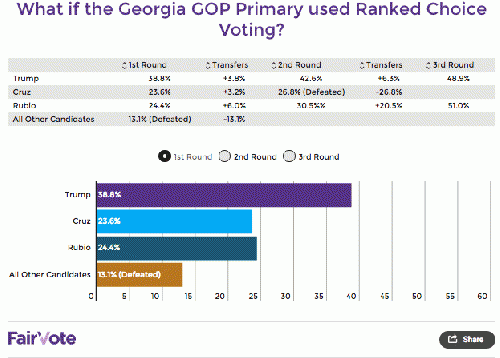Reprinted from www.fairvote.org
Posted by Andrew Douglas, Rob Richie, Elliot Louthen on March 04, 2016
Super Tuesday has come and gone, but headlines about Donald Trump's dominance would have been very different if the elections had been conducted under instant runoff voting, the single winner form of ranked choice voting. In fact, in head-to-head matchups with his strongest competitor, it is quite possible that Trump would have lost nine of eleven Super Tuesday states, along with the critically important Feb. 20th South Carolina primary. Instead, Trump has taken a commanding lead in the race for the nomination by winning pluralities in seven Super Tuesday states and a clean sweep of South Carolina's 50 delegates with less than a third of the vote.
By only allowing voters to select their first choice candidate, typical American elections do not accurately capture the complexity of voter opinion in a multi-candidate race. This shortcoming is particularly salient in this year's Republican presidential contest, as support from the majority of GOP voters that oppose Trump is divided among several challengers led by Senators Ted Cruz and Marco Rubio and Governor John Kasich.
If Super Tuesday contests had been conducted with ranked choice voting -- a proven system that empowers voters to rank candidates by preference in order to elect the candidate with the strongest support and the one most likely to garner the support of a majority -- the results would look very different. Our models suggest that Trump would have won Alabama and Massachusetts, competed in toss-up races in Tennessee and Vermont, and lost the remaining seven states.
To model RCV elections based on the Super Tuesday results, we averaged two Public Policy Polling (PPP) poll datasets from North Carolina and South Carolina that ask respondents about hypothetical matchups between candidates. These questions specifically included candidate preference among the entire field, among the frontrunner three-way race (Cruz, Rubio, and Trump), and respective head to head matchups. By measuring the average change in voter preference for each candidate when other specific candidates are eliminated (and ignoring undecided voters, although evidence suggests that most would have broken against Trump), we were able to estimate the second and third preferences for each candidate's supporters. This distribution is then applied to the actual Super Tuesday results in each state, using the election results as the first round starting point for each simulation. Our data and model can be reviewed at this spreadsheet.
To provide a concrete example, the following interactive graphic illustrates our simulated RCV election in Georgia:
Though Trump led the GOP field in Georgia with 38.8% of the vote on Super Tuesday, his support increases only incrementally in subsequent rounds of our simulated RCV election because large majorities of the supporters of other candidates likely would have prefered Cruz and Rubio. Ultimately, Rubio edges Trump 51% to 49% in the final instant runoff round of our simulation, despite Trump's fourteen point advantage in the initial round -- echoing our findings last week about Trump typically trailing in head-to-head polls and our YouGov/College of William and Mary poll.
Similar outcomes are modeled in the other Super Tuesday southern states, with each election becoming significantly closer when using RCV. Virginia, similar to Georgia, goes to a head to head matchup between Trump and Rubio, where the latter easily wins by more than 10 percentage points. Cruz decisively beats Trump in Arkansas by nearly 10 percentage points under RCV, despite trailing in the first round.
In the case of Alabama, Trump's vote share of 22% in the first round lead creates enough of a cushion to still win with RCV. In Tennessee, however, it would have been a toss-up, with Rubio and Cruz in a dead heat for second place once the field goes down to three, and then Rubio defeating Trump one-on-one and Cruz potentially doing so if undecided voters had broken his way. Outside the South, Trump would have easily carried Massachusetts, but Kasich would have seriously contended in Vermont where Trump led by merely 3 percentage points, 33% to 30%, in the actual vote.
Notably, there is no consistent beneficiary under RCV; rather, the Republican Party clearly has yet to settle on and coalesce around an alternative candidate. Our hypothetical for Super Tuesday shows Trump winning two states (Alabama and Massachusetts), Cruz winning four state (Alaska, Arkansas, Oklahoma and Texas), and Rubio winning three states (Georgia, Minnesota and Virginia) -- with Kasich having a real chance in Vermont and Tennessee too close to call.
These divided results provide further evidence that Republicans are facing a complicated and challenging nomination process no matter the voting system. Nonetheless, RCV would encourage candidates to find common ground with other candidates' supporters instead of waging scorched-earth, overly-negative campaigns that define politics today. As FairVote's primary focus series pointed out last week, RCV would almost certainly result in campaigns that are more civil and substantive based on findings from Rutgers-Eagleton Poll surveying seven cities using RCV in 2013-2014.
All of the Super Tuesday states utilize a form of proportional delegate allocation, where determining the singular winner is less important for delegate counts and more important for commanding media attention and providing campaign momentum. But all one has to do is watch Trump's Super Tuesday speech from to observe these phenomena in action, as his Super Tuesday victories were seen as a strong affirmation of his status as the frontrunner. For these proportional states, FairVote recommends eliminating candidates from the bottom up until all remaining candidates are above the threshold to win delegates, a change that would have put Rubio over the 20% threshold in Texas this past week.
Looking forward to winner-take-all states like the primaries in Ohio and Florida on March 15th, RCV would be fundamental to ensuring the winning candidate is actually the candidate with the most support. For example, looking back to South Carolina, we find that in an RCV election those fifty delegates would likely have gone to Rubio instead of Trump, with Rubio winning by nearly nine percentage points in the final round.
In our current primary system, attention and momentum is often misdirected. Ranked choice voting would accurately measure the second and third choice support of GOP voters to truly reveal the energy behind each candidate and ultimately nominate the candidate who best reflects majority opinion within the party.
(Note: You can view every article as one long page if you sign up as an Advocate Member, or higher).






